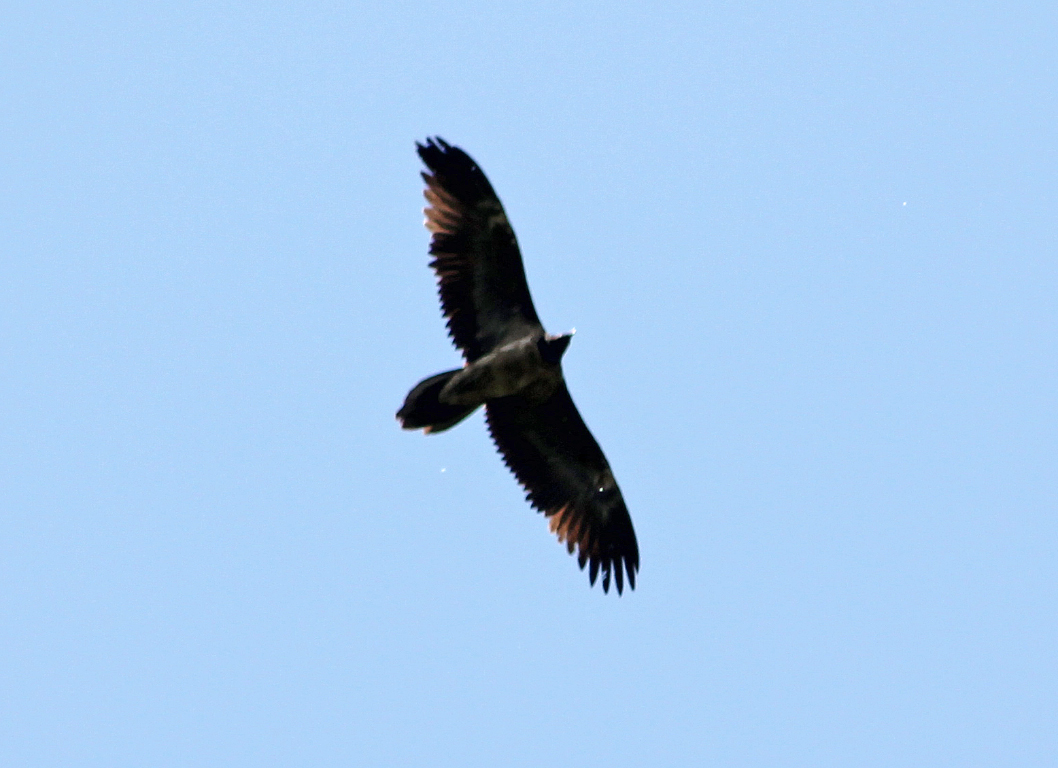Afgelopen donderdag in Wales: https://vimeo.com/166725854 (draai hoofd of monitor). De Belgische vogel?
Lammergier · 03-06-2002 · Texel, de Tuintjes · Rob Halff
Jan Hein van Steenis · 15 mei 2016 22:59
Arnoud B van den Berg · 6 februari 2018 23:08
BirdGuides 06/02/2018Share Lammergeier fails to make the grade
The British Ornithologists' Union Records Committee (BOURC) has announced that the Bearded Vulture (Lammergeier) seen at various sites in Wales and southern England in May 2016 has been placed in Category E of its British list. This category lists introductions, human-assisted transportees or escapees from captivity, as well as species whose breeding populations (if any) are not considered self-sustaining, and species included in it do not form part of the British list (unless they are also included in Categories A, B or C).
First reported a stone's throw from the M4 bridge at Sudbrook, Gwent, on 12 May 2016, the immature vulture was later seen in Devon at Brent Moor on 16th and Cookworthy Moor Plantation on 20th before being photographed over Breney Common, Cornwall, on 23rd. There were several other reports of the bird from southern England during this period, and it later transpired that the Gwent sighting was pre-dated by an observation of the same bird, with photos, from Kent. It had also previously been noted near the village of Pollinhkove, Belgium, on 9 May.

The Bearded Vulture was photographed soaring over Breney Common, Cornwall, on 23 May 2016 (Rowena Castillo Nicholls).
The appearance of a number of wandering Bearded Vultures during the past few years in north-west Europe, well away from their mountain breeding ranges in the Alps, where the species has been reintroduced, and the Pyrenees, has generated wide interest, particularly in light of similar observations of Griffon Vultures, which have been shown to have a mainly wild origin. However, it seems highly likely that all the recent wandering Bearded Vultures derive from reintroduced Alpine populations, which are now increasing but, according to the BOURC, not yet considered self sustaining, rather than from natural populations in the Pyrenees. This has resulted in the species being placed in Category E.
The same categorisation has been adopted by other national bird committees in north-west Europe where Bearded Vultures have been reported, including Belgium (see, for example, Rare Birds in Belgium in 2016).
In other, perhaps less contentious, news, BOURC has also announced that it considers the Demoiselle Craneseen at various sites in Cumbria in March 2016 to be of dubious origin. With the species widely kept in collections and, as yet, little evidence to suggest natural vagrancy is occurring in western Europe, the appearance of this individual at a time inconsistent with the species' migration and without clear evidence to suggest a natural origin, ensured the Committee voted to place it in Category E.
Gebruikers van het forum gaan akkoord met de forumregels.
Forum spelregels
Dutch Birding Association beoogt met het forum in de fotogalerij de lezer een platform te bieden waarop informatief en inhoudelijk gediscussieerd kan worden over zeldzame en schaarse vogels. Het forum staat daarmee in het verlengde van het (semi-) wetenschappelijke karakter van het blad Dutch Birding.
Om het gebruik van het forum in goede banen te leiden, heeft Dutch Birding de volgende regels opgesteld: de moderatoren kunnen reacties verwijderen die
- een degelijke onderbouwing van de determinatie missen
- als beledigend of kwetsend kunnen worden ervaren door andere forumgebruikers
- off-topic zijn
- spam of reclame bevatten
- zij beschouwen als trolling
Auteurs die zich niet houden aan de bovenstaande regels krijgen een waarschuwing en bij herhaling van het overtreden van bovenstaande regels behoudt het DBA bestuur zich het recht voor om het account van de auteur te blokkeren.
De moderatoren hebben het recht om zonder opgaaf van reden, onder verwijzing naar de spelregels, reacties te verwijderen.
Erger je je aan het trollen van anderen, realiseer je dan dat met niet-reageren cq doodzwijgen het trollen het snelst stopt. Reageer niet! Sein de moderatoren in via foto@dutchbirding.nl, zodat zij gepaste actie kunnen ondernemen.
